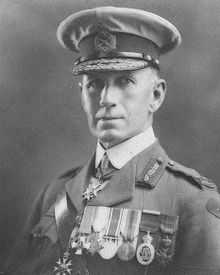Walter McNicoll
| Sir Walter Ramsay McNicoll | |
|---|---|
 | |
| Born |
27 May 1877 Emerald Hill, Victoria, Australia |
| Died |
24 December 1947 (aged 70) Sydney, New South Wales, Australia |
| Allegiance |
|
| Service/branch | Australian Military Forces |
| Rank | Brigadier General |
| Commands held |
10th Brigade 6th Battalion |
| Battles/wars |
First World War |
| Awards |
Knight Commander of the Order of the British Empire Companion of the Order of the Bath Companion of the Order of St Michael and St George Distinguished Service Order Mentioned in Despatches (5) Croix de guerre (Belgium) |
| Relations |
Major General Ronald McNicoll (son) Vice Admiral Sir Alan McNicoll (son) |
| Other work |
Member for Werriwa Administrator of the Mandated Territory of New Guinea |
Brigadier General Sir Walter Ramsay McNicoll KBE, CB, CMG, DSO (27 May 1877 – 24 December 1947) was an Australian teacher, soldier, and colonial administrator.
Early life
McNicoll was born in the Melbourne suburb of Emerald Hill, the grandson of a Scottish migrant (from Glenisla, near Dundee). He trained as a teacher in the Victorian Education Department and at Melbourne University. He held posts in various country schools in Victoria, then as senior master at Melbourne High School and, from 1911 to 1914, founding principal of Geelong High School. At the same time he had been active in the Victorian militia, which at the outbreak of World War I became part of the Australian Imperial Force (AIF).[1]
World War I
As a lieutenant colonel, McNicoll commanded the 6th Battalion, 2nd Australian Brigade, at Gallipoli and was seriously wounded during an infantry charge in the second battle of Krithia on 8 May 1915. (The brigade suffered 36 percent casualties in the course of two hours of action.) He was found on the battlefield that evening by Charles (C.E.W.) Bean, then a war correspondent—later, Australia's official war historian. Bean piled discarded packs around him as protection against the still-continuing small arms fire and returned in the night with a stretcher party. McNicoll was invalided to Alexandria and then to London, where a second operation finally located and removed the bullet from his abdomen.[1]
Following a year's recuperation in Melbourne, McNicoll was promoted to brigadier general and given command of the 10th Infantry Brigade of the 3rd Division, AIF—under the divisional commander Major General John Monash (and his successor, after Monash's appointment as corps commander, John Gellibrand). From December 1916 to the armistice nearly two years later, the brigade was part of numerous actions on the Western Front, including Messines, Ypres, the Somme, and Amiens.[1]
Later life
After the war McNicoll returned to teaching as founding principal of what is now the Argyl School in Goulburn, in southern New South Wales. In 1931 he stood for and won the seat of Werriwa (extending from Goulburn to the coast) in the federal parliament, running as a member of the Country Party. He resigned towards the end of his first term, however, when he was appointed Administrator of the Mandated Territory of New Guinea.
He served in that position from 1934 up to the time of the Japanese invasion in 1942. (In this period, the northern part of what is now Papua New Guinea, including New Britain and Bougainville, was administered by Australia under a League of Nations mandate; the southern part, Papua, was an Australian colony.) The manifold responsibilities of Administrator ranged from education and justice to defence, with often conflicting advice or direction coming from the Permanent Mandates Commission and the Australian government and pressures as well from the various religious missions and commercial mining and plantation interests—the latter nearly the sole source of the Territory's revenues. Keenly interested in exploration, he led an expedition to the upper Sepik in 1935 (the party included the young J.K. McCarthy) and subsequently sponsored the Hagen-Sepik Patrol (1938–39) which explored the last great unknown tract of the Territory. He was knighted for his work organizing relief efforts after the 1937 volcanic eruption that nearly destroyed the territory's capital, Rabaul.[1]
He was married to Hildur Marschalk Wedel Jarlsberg, from a distinguished Norwegian family. They had four surviving children, two attaining senior positions in the Australian military (Major General Ronald McNicoll CBE, AM and Vice Admiral Sir Alan McNicoll KBE, CB, GM), a third, David McNicoll CBE, a well-known Sydney journalist. He died in Sydney.[1]
Notes
- ↑ 1.0 1.1 1.2 1.3 1.4 McNicoll, Ronald (1986). "McNicoll, Sir Walter Ramsay (1877 - 1947)". Australian Dictionary of Biography. Canberra: Australian National University. Retrieved 14 November 2008.
References
- Les Carlyon, Gallipoli. Melbourne: Pan Macmillan, 2001.
- J. K. McCarthy, Patrol Into Yesterday. Melbourne, 1963.
- Ronald McNicoll, Walter Ramsay McNicoll 1877-1947. Melbourne, privately printed, 1973. (Copy in the National Library of Australia, Canberra.)
- R. R. McNicoll, "Sir Walter McNicoll as Administrator of the Mandated Territory," Journal of the Papua & New Guinea Society, vol. 2, no. 2 (1969), pp. 5–16.
- Sir John Monash, The Australian Victories in France in 1918. Sydney, 1936.
| Parliament of Australia | ||
|---|---|---|
| Preceded by Bert Lazzarini |
Member for Werriwa 1931 – 1934 |
Succeeded by Bert Lazzarini |